Our business depends on responsible stewardship of nature, the source of our produce that will sustain our future.
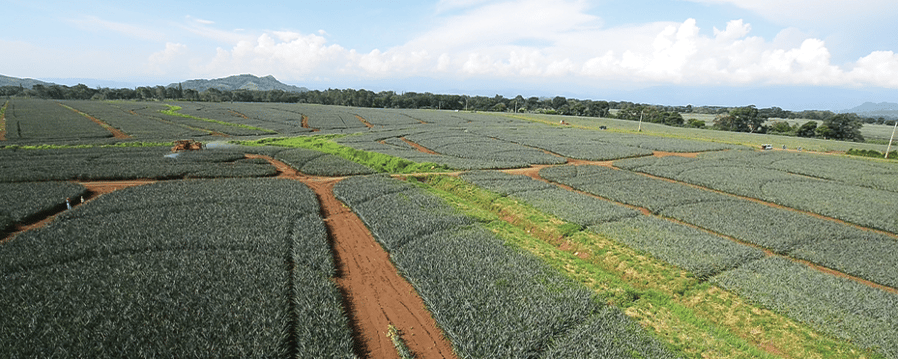
Pineapple field in Bukidnon, Philippines
DMPI’s close to a century of growing and manufacturing attest to how it has sustained the environment and its own operations.
Efficient and ecological land use management is foundational to Del Monte Philippines, Inc.’s (DMPI) sustainable agricultural practices which started nearly a century ago in 1926. Our farming pioneers did not clear forests to establish pineapple fields. Additional land later acquired was cultivated with other crops.
Our land-use practices have been focused on improving plantation yield through ecologically friendly land preparation, use of sustainable planting materials, plant nutrient application, efficient water sourcing, drainage and plant disease management.
DMPI complies with environmental regulations and requirements of the Department of Environment and Natural Resources (DENR), Clean Air Act, Clean Water Act, and Solid and Hazardous Waste Management.
Certification audits are conducted on a periodic basis to ensure the Company complies with the certification standards including environmental audits. GLOBALG.A.P. and PhilGAP certification includes Environment Management System (Site Management, Soil Management, Fertilizer Application Management, Water Management, Integrated Pest Management and Plant Protection Products Management), Food Safety, Quality Management System, and Workers Occupational Health and Safety.
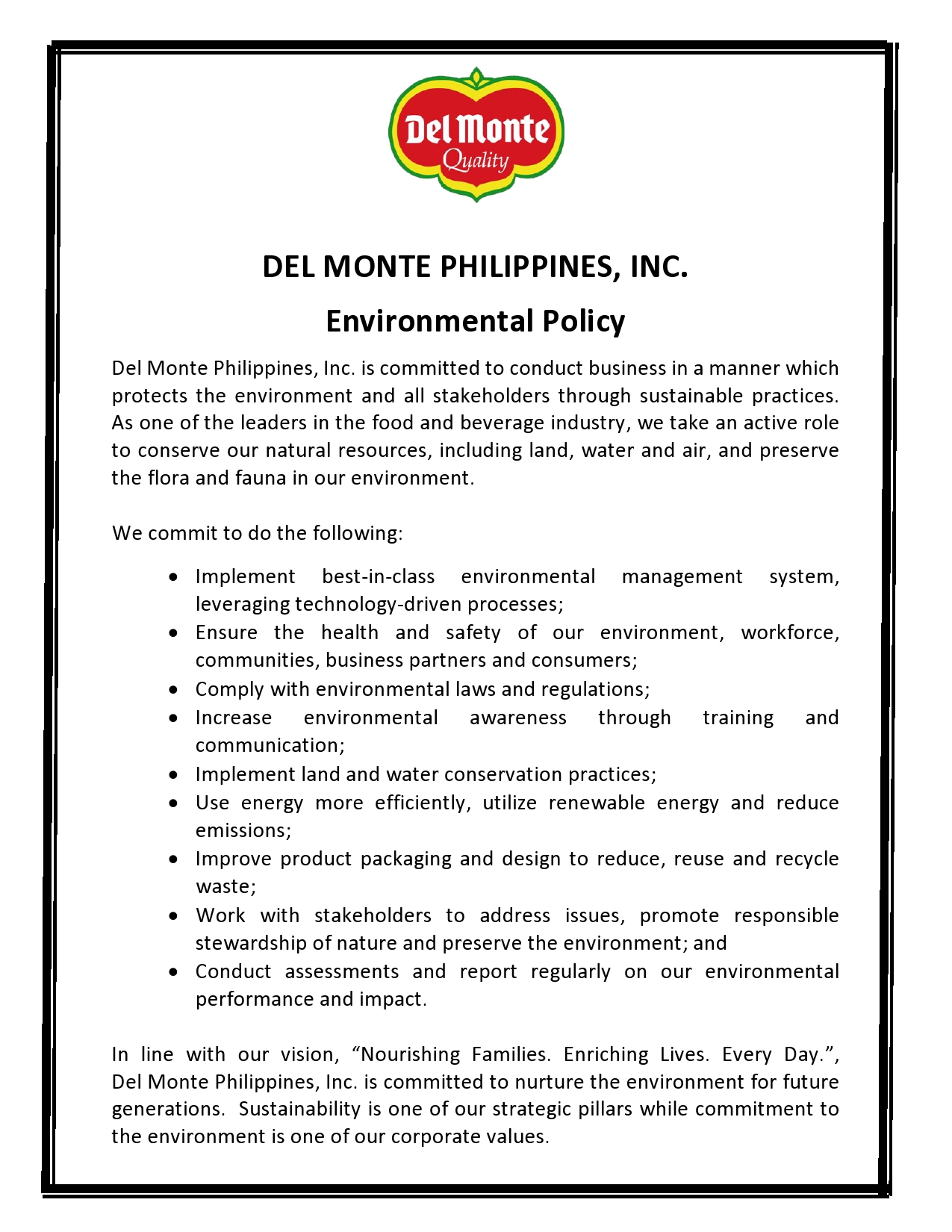
.png?width=900&height=536&name=Preserving%20Nature_DMPI%204%20Key%20Projects%20(1).png)
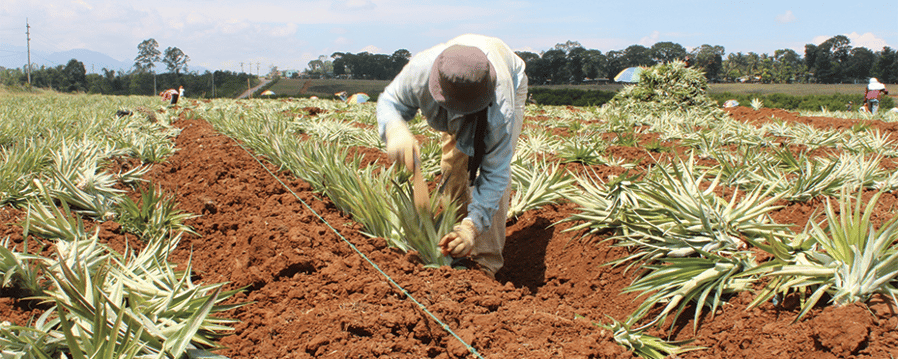 Pineapple planting in Bukidnon, Philippines
Pineapple planting in Bukidnon, Philippines
As efficient management of soil directly impacts our long-term productivity, we focused on regenerating topsoil and improving biodiversity on and below the ground.
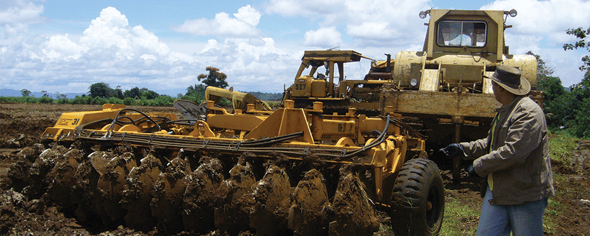
Soil management
1. In the Philippines, DMPI is working on a soil conservation project to maintain land productivity, mitigate topsoil loss, prevent soil erosion and reduce loss of soil nutrients.
2. The Company plants cover crops as ground covers along main road shoulders before the boundary canal and maintains the grass levels on side slopes of permanent waterways to prevent erosion after heavy rains.
The Crop Growing Units use drone images to dredge ditches, install auxiliary canals and silting basins for each field, and plants along river easement near pineapple fields to prevent soil erosion.
5. DMPI’s Drone Program displays the land topography and monitors the pineapple field in Bukidnon and Misamis Oriental. Drone sensors produce a complete image of a field when planting is completed. Seeds take root and show growth within 2-3 months after planting.
6. The Company has a soil map used by our Agricultural Research Laboratory to regularly analyze soil nutrients except nitrogen and organic matter.
7. DMPI uses Meteoblue high-resolution weather data to measure the five-day and fourteen-day rainfall on location-specific, daily and hourly resolution forecast in each field.
8. For Del Monte in the U.S., understanding and analyzing the agronomics of a new variety is important for environmental adaptation.
9. DMPI conducted a thorough review of its Soil Conservation manual and revision was made on canal geometries and water velocities.
10. DMPI uses a soil and water assessment tool program to monitor the health status of its resources.
11. The Geomatics team uses near-infrared spectroscopy to detect changes in internal maturity and translucency in fresh fruits using a non-destructive inspection.
12. The team has implemented a new workflow for detecting field depression for quality of land preparation after the 2nd pass chopping. By processing topography drone flight data following a specialized workflow, it enables the early detection of possible waterlogging in fields even before planting takes place.
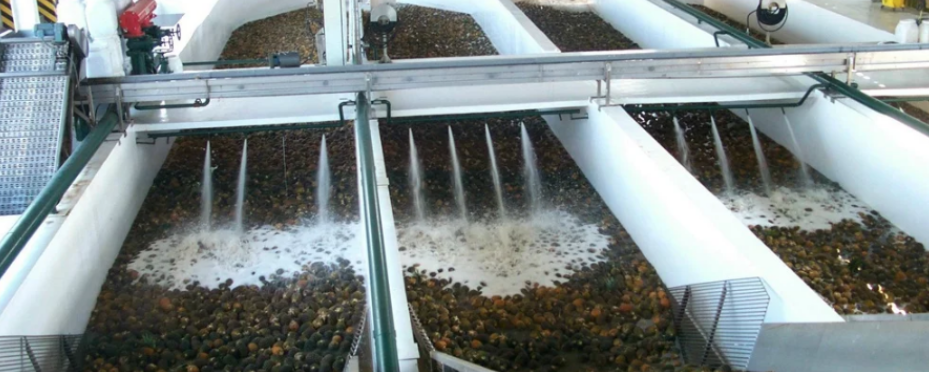
Fruit receiving line in cannery
Water is one of Del Monte’s impact areas with respect to growing and packing operations but access to it is threatened by climate change.
1. The Company proactively manages water use through efficiency measures, including selecting drought-resistant seeds, promoting drip irrigation and recycling water used in production in our cooling towers. We discharge used and treated water into spray fields, where it can re-enter and recharge groundwater stores and local streams.
2. To conserve freshwater usage and avoid water treatment costs, DMPI uses water from steam and pineapple juice of our evaporators, and from mill juice from our Reverse Osmosis (RO) system for Ultrafiltration System Clean-in-place (CIP) and Ion Exchange Plants regeneration.
3. The cannery and bottling plant operations in the Philippines monitor the Water Use Ratio (WUR), i.e. liters of water used per common case. DMPI’s facilities WUR is 12% lower compared to the previous year, while the plantation operations WUR increased by 2% in liters per farm hectare due to more growing fields.
4. DMPI toll manufacturers’ water conservation programs eliminate waste and reduce water consumption. Wastewater discharges of all toll manufacturing lines are within regulatory standards. WUR in beverage and culinary toll manufacturers are monitored and reduced each year.
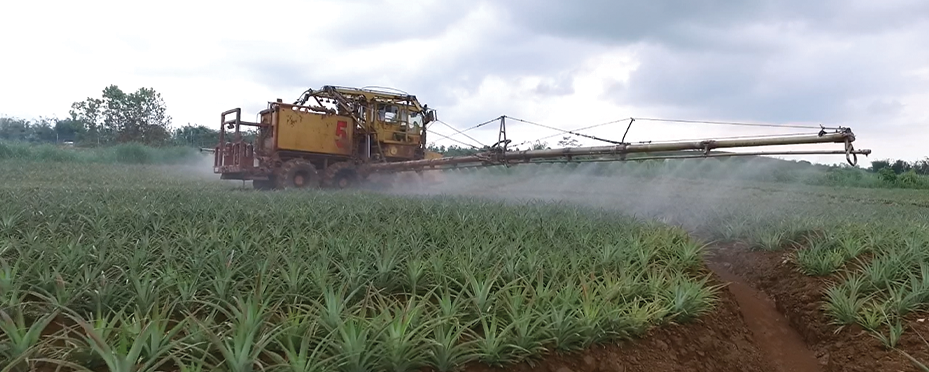
Pineapple spray operation in Bukidnon, Philippines
The foundation of DMPI’s sustainable agriculture practices is efficient land use. Ecologically-minded land use management was carried on by our pioneers who started farming in 1926.
Across over 90 years of operations, our land-use practices are mainly aimed at improving plantation yield through ecologically friendly land preparation, plant disease management, and chemical application, efficient water sourcing and drainage, and the use of sustainable planting materials.
We help growers apply the principles of Integrated Pest Management (IPM) to minimize pesticides.
In the Philippines, Del Monte obtained the Rainforest Alliance certification. The Company implemented an IPM for its pineapple plantation. It has discontinued five pesticides and is depleting the stock of two other pesticides.
DMPI installed manure and black light traps as a natural method to prevent white grub infestation. It installed a Grubs Alert System which targets chemical control against grubs more precisely.
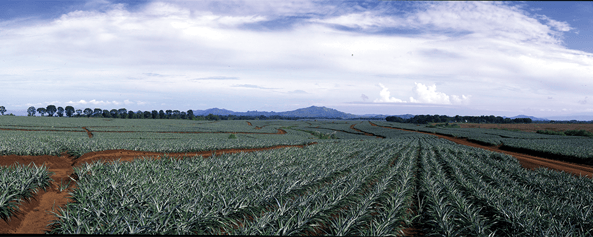
Pineapple plantation in Bukidnon, Philippines
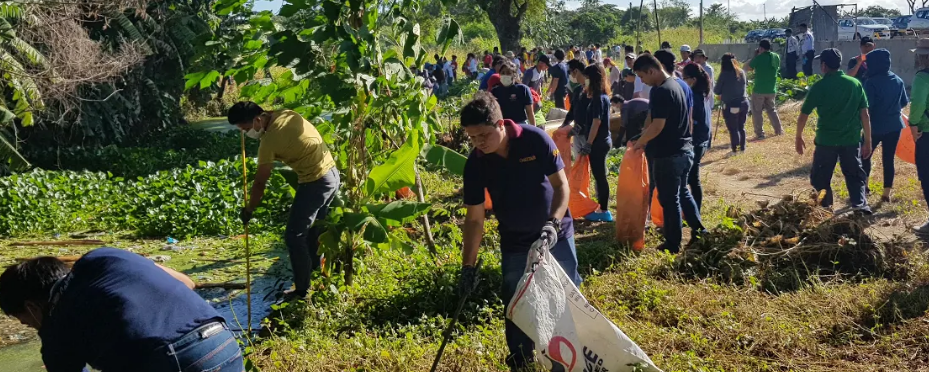
River clean-up drive by Del Monte employees in Laguna, Philippines
We are also committed to sustainable waste management across our operations. We aim to reduce the overall consumption and usage of raw materials in all facets of our operation, including toll manufacturers. In line with this, we encourage the reuse of materials in all areas of operation. We promote the concept of recycling and the benefits of utilizing recycled materials. When disposal is the only option, we seek to dispose of materials in an environmentally safe and responsible manner. We understand that the correct handling, storage, and disposal of waste materials is essential to comply with environmental regulations and pollution prevention.
Our pineapple pulp waste disposal system, a pioneering effort that started in the 1950s, converts a by-product of the cannery into feed for our cattle farm at the plantation. This helps us reduce waste and cut costs.
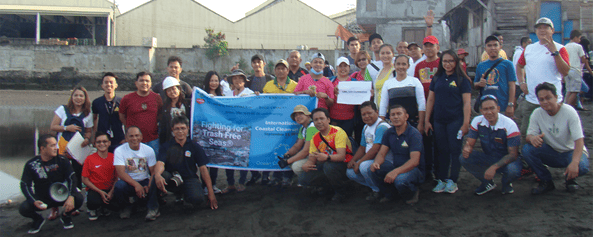
Coastal Clean-up of Macajalar Bay, Philippines
1. DMPI implements ongoing plastic packaging reduction initiatives and has set a goal to use biodegradable PET bottles by FY2026.
2. To comply with the Extended Producer Responsibility Law, Del Monte in the Philippines submitted its waste diversion program to the DENR and targets to divert at least 20% of its FY22 plastic footprint in 2023.
3. Solid wastes and recyclable materials in the plantation community are segregated and sold to fund community projects.
4. All toll manufacturers in the Philippines practice waste segregation and management. DMPI ensures that all our toll manufacturers comply with water and smoke discharge regulations.
5. The DMPI office in Manila is LEED Silver-certified, a green building symbol recognized around the globe. The building system conserves water and employees practice waste segregation. Del Monte in the Philippines pursues packaging sustainability goals to reduce its packaging carbon footprint.
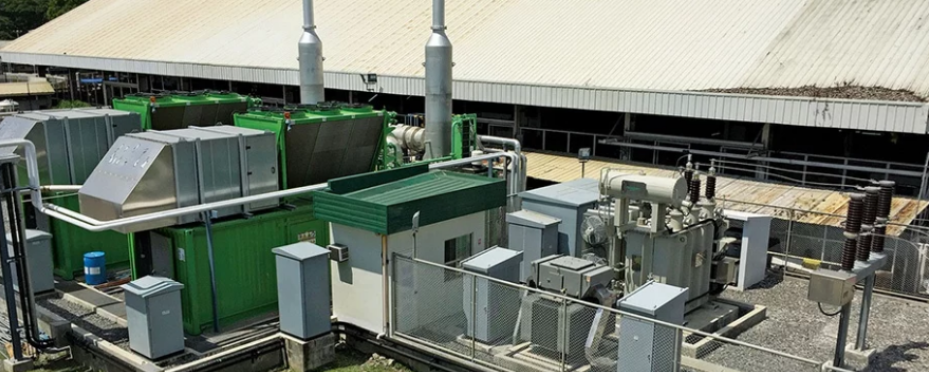
The generator sets for the waste-to-energy facility in the Philippines
Climate change is a business risk, from altering the growing season to delaying shipments due to extreme weather and increasing costs for resilience measures. To reduce carbon emissions, we have undertaken initiatives to explore more efficient energy sources, strengthen energy conservation in worksites, and reduce process waste.
DMPI became one of the few companies in the Philippines to be certified as carbon negative for scopes 1, 2 and 3 (air travel and fuel used by vehicles) for its pineapple operations. The quantification and reporting of the GHG emissions have been independently verified by the British Standards Institution (BSI) against ISO 14064-1:2018 specifications. The verification activity has been carried out in accordance with ISO 14064-3:2019 and the principles of ISO 14065:2020.
1. DMPI’s carbon sequestration through its vast 28,000-hectare plantation and around 665,000 trees planted to increase the forest cover around its plantation more than offsets DMPI’s carbon emissions.
2. Del Monte’s waste-to-energy facility converts the cannery’s wastewater into renewable energy. The facility generates 2.8 MW of electricity and cleanses water discharged at coastal waters of Macajalar Bay, which has Biochemical Oxygen Demand levels better than government mandated levels of 100 mg/liter.
The waste-to-energy facility produced about 19% of the cannery’s power requirement in FY23.
3. The Company has disaster recovery and business continuity plans to minimize the adverse effects of environmental incidents and initiatives to mitigate the effects of El Niño and La Niña.
4. Del Monte Philippines’ waste-to-energy facility ensures 100% wastewater treatment and serves as a shield against unstable power supply and power cost increases.
The plant complemented the job performed by an eco-effective but power-intensive aerobic treatment plant5. DMPI’s bottling plant and Manila office purchase their electricity from a Retail Electricity Supplier (RES) to save on costs. Part of the electricity purchased from RES comes from renewable sources.

Tree planting activities by Del Monte employees
Under our sustainability framework, we have significantly enhanced our stakeholder advocacy program for environmental conservation. Our carbon footprint remains carbon-negative. However, we continue to undertake many initiatives during the year to reduce process residues, strengthen energy conservation in all worksites and plantation homes, and explore more efficient energy sources.
1. The Del Monte Foundation pursued tree-growing efforts by partnering with schools and organizations in the plantation vicinity to gather tree-planting volunteers.3. The Company has planted around 665,000 indigenous and commercial trees to date, including about 35,000 planted in FY23 in different areas of Bukidnon by the Del Monte Foundation, Plantation Operations, DEARBC cooperative, Xavier Science Foundation and Local Government Units for reforestation and soil conservation.
4. We are mindful of the diverse flora and fauna around the plantation and ensure they are protected and cared for.
5. Our arboretum in Cawayanon consists of more than 80 different species that are all native to the Philippines, including some that are endemic. It now serves as a gene bank as a source of future reforestation projects of the Company.
Contadina (Facebook site only accessible in the Philippines)
Del Monte CareersDel Monte Philippines, Inc., JY Campos Centre 9th Avenue corner 30th Street,
Bonifacio Global City, Taguig City, 1634 Philippines Tel: +632 8856 2888 Fax: +632 8856 2590